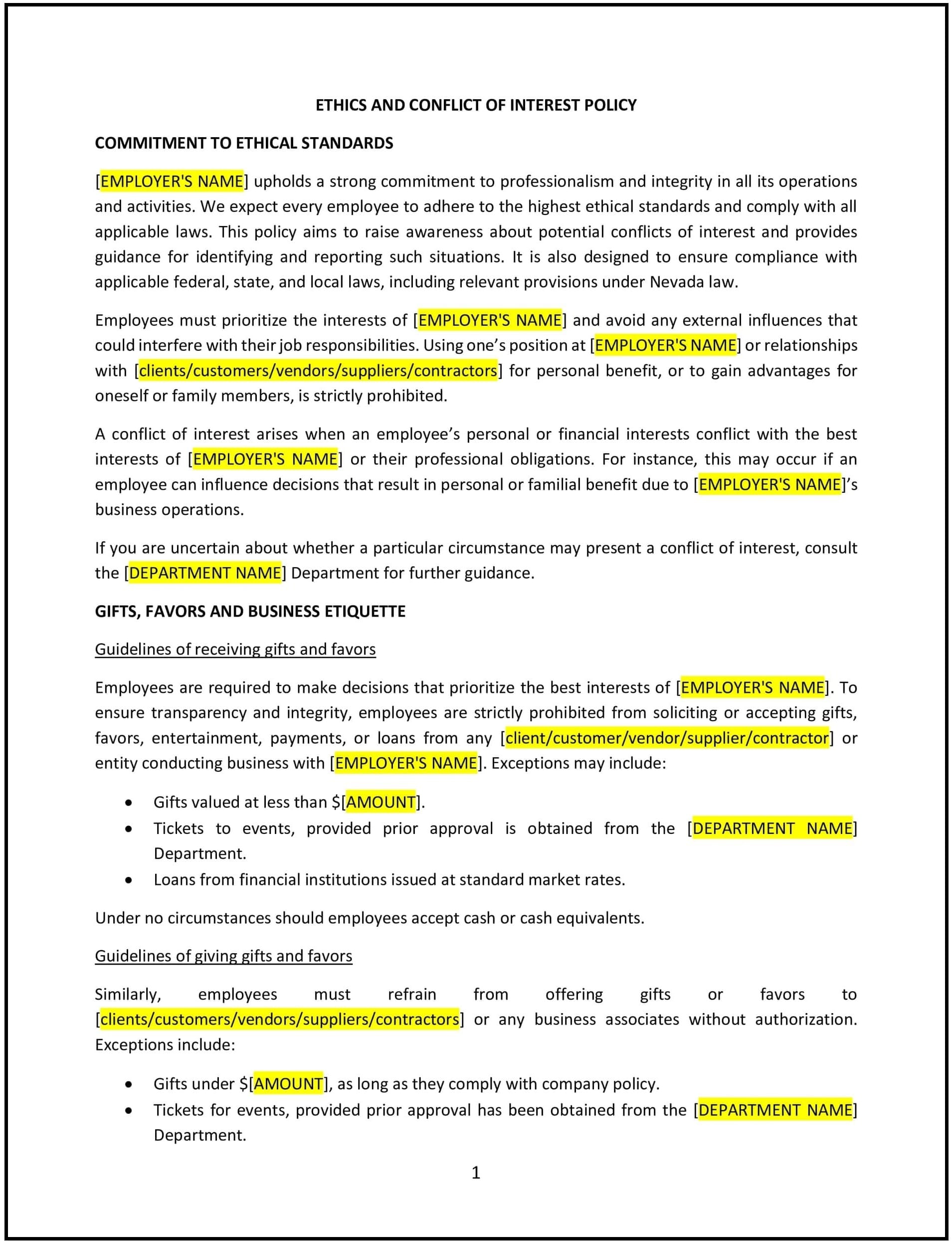Ethics and conflict of interest policy (Nevada): Free template
Got contracts to review? While you're here for policies, let Cobrief make contract review effortless—start your free review now.

Customize this template for free
Ethics and conflict of interest policy (Nevada)
This ethics and conflict of interest policy is designed to help Nevada businesses maintain the highest standards of ethical conduct and avoid conflicts of interest in the workplace. It outlines the company’s expectations for employees regarding ethical behavior, decision-making, and disclosure of potential conflicts of interest.
By adopting this policy, businesses can protect their integrity, ensure fair and impartial business practices, and safeguard the company’s reputation.
How to use this ethics and conflict of interest policy (Nevada)
- Define ethical conduct: Clearly define the company’s expectations for ethical behavior, including honesty, integrity, transparency, and respect in all professional interactions and decision-making processes.
- Identify conflicts of interest: Provide examples of situations that could create a conflict of interest, such as employees having personal financial interests in vendors, clients, or competitors, or participating in outside business activities that could interfere with their duties to the company.
- Set disclosure requirements: Require employees to disclose any potential conflicts of interest to HR, their manager, or another designated person. Establish a procedure for employees to follow when reporting potential conflicts, including the format and timeline for disclosure.
- Establish review and resolution processes: Outline how the company will review and address reported conflicts of interest. Specify that conflicts will be evaluated on a case-by-case basis and that employees may be required to recuse themselves from decisions or activities where conflicts exist.
- Prohibit bribery and corruption: Make it clear that bribery, kickbacks, and other forms of corruption are strictly prohibited. Employees should not accept gifts, favors, or other benefits that could influence their professional judgment or create an appearance of impropriety.
- Encourage transparency: Emphasize the importance of maintaining transparency in all business dealings, including disclosing any relationships or financial interests that could reasonably be perceived as conflicts of interest.
- Set consequences for violations: Clearly outline the consequences for violating the ethics and conflict of interest policy, including disciplinary actions that may range from a warning to termination, depending on the severity of the violation.
- Provide resources for guidance: Ensure that employees know who to contact if they are uncertain about whether a situation constitutes a conflict of interest. Provide resources or training to help employees understand what constitutes ethical behavior and conflicts of interest.
Benefits of using this ethics and conflict of interest policy (Nevada)
This policy provides several key benefits for Nevada businesses:
- Protects the company’s reputation: By upholding high ethical standards, the company fosters trust with clients, customers, and partners, helping to protect its reputation and strengthen business relationships.
- Ensures fairness and impartiality: The policy ensures that business decisions are made fairly and without personal bias, promoting equal opportunity and transparency within the organization.
- Reduces legal and financial risks: By preventing conflicts of interest and unethical behavior, the company can reduce the risk of legal action, fines, and other penalties that may arise from unethical practices.
- Promotes a positive workplace culture: The policy fosters a culture of integrity, where employees feel confident that decisions are made based on merit, fairness, and ethical principles.
- Improves decision-making: Clear guidelines for ethical behavior and conflict of interest disclosure help employees make decisions that are in the best interest of the company, free from personal bias or influence.
Tips for using this ethics and conflict of interest policy (Nevada)
- Communicate the policy clearly: Ensure that all employees are aware of the ethics and conflict of interest policy and understand their responsibilities regarding ethical behavior and conflict disclosure. Use employee handbooks, onboarding sessions, and company-wide communications to reinforce the policy.
- Encourage reporting: Foster a culture where employees feel comfortable reporting potential conflicts of interest without fear of retaliation. Make sure employees know where and how to report conflicts and emphasize the importance of transparency.
- Review conflicts promptly: When conflicts of interest are reported, review them promptly and take appropriate action to resolve them. Ensure that employees who disclose conflicts are treated fairly and that any necessary adjustments to roles or responsibilities are made.
- Provide regular training: Offer ongoing training for employees to help them recognize potential conflicts of interest and understand the ethical expectations of the company. Training can be part of annual refresher courses or onboarding for new employees.
- Monitor compliance: Regularly assess the company’s adherence to the ethics and conflict of interest policy through audits, employee surveys, or feedback mechanisms. Make sure employees are following the policy and that conflicts are being managed appropriately.